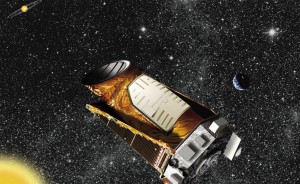George Mason Observatory’s ‘Evenings Under the Stars’ series (where you’ll also get to look at awesome galaxies, stars, planets and more through our 0.8 meter telescope!) is back for Spring 2014! The next event will be Monday, April 14th and will feature a talk by Prof. Joe Weingartner on ‘Kepler Observatory Results – Finding Exoplanets’! Talk at 7:30 PM. Observing starts at 8:00PM until 9:30PM. Arrive at the lobby of Research Hall. As always the event is free and everyone is invited! We hope you can come out and join us!
Remember that there will only be one talk given during each observing session so make sure you don’t miss it! Directions to GMU and Research Hall here: http://eagle.gmu.edu/map/fairfax.php Zoom in to find Research Hall next to engineering building and York River Rd. Keep an eye on twitter for updates – Just keep an eye out for weather – the event may be postponed or cancelled due to bad conditions – updates will be available here – Observatory Twitter
About the talk:
The Kepler observatory is a space based telescope that has been looking for planets orbiting stars outside of our solar system since its launch in March 2009. The mission has been incredibly successful and has to date found 961 planets in more than 76 solar systems and additionally has over 2,600 additional candidate planets. These discoveries have changed the way scientists look at the universe and suggest that our galaxy (along with others) are teeming with planets! Come learn about the mission, how it looks for planets and about some of the planets found by Kepler at this talk!
About the speaker:
Dr. Joe Weingartner is an associate professor in the School of Physics, Astronomy and Computational Science at George Mason University. From 1999 through 2003, he was a postdoc at the Canadian Institute for Theoretical Astrophysics, at the University of Toronto. He received his Ph.D. in physics in 1999 from Princeton University , under the supervision of Bruce T. Draine. His research focuses on physical processes associated with cosmic dust. He also teaches General Relativity and Planetary Science at George Mason so feel free to pepper him with questions on those topics!



 Additional questions and feedback on the Observatory site can be addressed to:
Additional questions and feedback on the Observatory site can be addressed to: